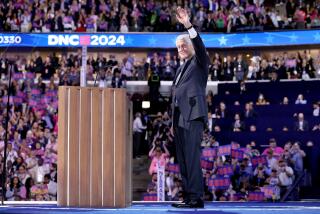Clinton Backs Bush on Mideast
NEW YORK — Former President Clinton supported President Bush’s handling of the Israeli-Palestinian crisis and critiqued his own foreign policy in an impromptu debate with panelists at a conference here Thursday.
Edging back into a public role, Clinton defended the broad thrust of U.S. policy in the Middle East under his and Bush’s administrations. But Clinton also said he believed he had not done enough in office to push Arab states toward democracy.
“One of the most difficult things for us is to find a way to both work with countries with whom we have common interests and continue to advance democracy” in those nations, he said. “I didn’t do as good a job at that as I should have, but I couldn’t figure out how to do it.”
Clinton disputed repeated charges made during the session that Bush has given Israeli Prime Minister Ariel Sharon an unrestricted green light for military action in response to violence by Palestinians.
“It’s . . . not fair to say President Bush has not done anything to try to restrain excessive behavior by the Israeli government,” Clinton said.
Still, Clinton seemed to gently separate himself from his successor by suggesting that Anthony C. Zinni, Bush’s special envoy to the Mideast, should be more active in the region.
“I think Gen. Zinni ought to go out there to stay; both sides seem to like him and they have confidence in him, and I hope he will,” Clinton said.
Clinton made his comments at a daylong session on America and Islam that brought together academics, diplomats and other experts--but no major officials from his administration--for a high-minded, at times abstract, seminar that saw panelists stress Arab grievances against the United States.
The conference, at New York University, was the first sponsored by the William J. Clinton Presidential Foundation, and it came a day after the former president returned from a weeklong trip to the United Arab Emirates, Saudi Arabia, Egypt and Israel. Clinton established the foundation to promote causes he hopes to advance.
Clinton made his most extensive comments after several panelists argued that anti-American sentiment in Muslim countries was rooted not in cultural hostility toward the United States but opposition to U.S. foreign policy, particularly toward Israel.
“There is no wave of anti-Americanism” in the Arab world, insisted Ahmed Kamal Aboulmagd, a law professor at Cairo University. “People love the U.S. in the Arab-Muslim world; but this love is not being reciprocated.”
Raghida Dergham, a senior correspondent at the London-based pan-Arab Al Hayat newspaper, said anti-American sentiment was grounded in “the many imperfections of [U.S.] foreign policy,” especially regarding the conflict between Israel and the Palestinians.
Clinton diplomatically but unequivocally rejected many of those arguments.
Reacting to charges that the U.S. had not done enough to pressure Israel toward peace, Clinton noted that it was the Palestinians who rejected the peace accord he tried to broker in his administration’s final months. And it was the rejection of that agreement, Clinton argued, that brought Sharon’s hard-line government to power.
“You may agree the Palestinians were right to say no,” Clinton said. “But there are consequences to all decisions. And the consequence of their saying no was the election of Mr. Sharon, because . . . [Israelis] thought the peace process was dead. . . . And now we are off to the races.”
In his opening remarks, Clinton praised Bush’s management of the war in Afghanistan. But he also advised that to lastingly reduce the threat of terror, developed countries must expand their efforts to promote growth in the Arab world--while also pushing Arab countries to pursue internal reforms.
“Building the world we want . . . will require much more of us than a strategy rooted in military and law enforcement efforts, no matter how successful they are,” Clinton said.
More to Read
Sign up for Essential California
The most important California stories and recommendations in your inbox every morning.
You may occasionally receive promotional content from the Los Angeles Times.










